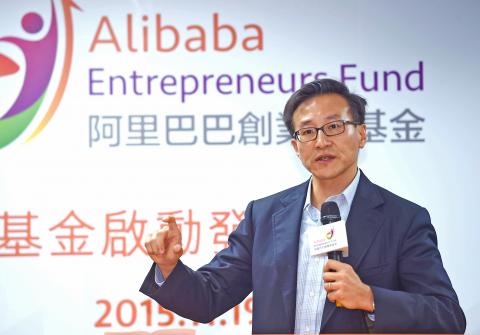Alibaba Group Holding Ltd (阿里巴巴) yesterday launched a NT$10 billion (US$304.32 million) fund to invest in Taiwanese start-ups, with the objective of supporting companies that plan to utilize the resources offered by Alibaba’s ecosystem.
The Taiwan Entrepreneurs Fund (台灣創業者基金) is to be under the control of executive director Andrew Lee (李治平), who was formerly the chief financial officer at Entie Commercial Bank Ltd (安泰銀行), Alibaba said.
The fund’s board of directors has picked the China Development Industrial Bank (中國開發工業銀行) as its investment manager to evaluate the business potentials and feasibility of the proposals put forward by local start-ups, Alibaba executive vice chairman Joseph Tsai (蔡崇信) said.

Photo: Fang Pin-chao, Taipei Times
Tsai said chairman Jack Ma (馬雲) has been discussing how to assist Taiwan’s young entrepreneurs since Ma visited Taiwan in the beginning of this year.
“Alibaba’s mission is to make it easy to do business anywhere. We hope this initiative can solve Taiwanese start-ups’ common funding problems,” Tsai told a press conference in Taipei.
“The fund is not a charity. We want to invest in the most promising start-ups that put forward the best ideas,” Tsai said.
Tsai said Alibaba or the fund would not control the selected start-ups or intervene in their operations.
“However, we require start-ups to share profits with the fund or return the investment to it once they become profitable, so the fund can sustain itself and continue to help other start-ups,” Tsai said.
Lee said the start-ups that wish to apply for funding must be run by Taiwanese. Moreover, their products or services have to take part in Alibaba’s ecosystem of e-commerce, logistics, mobile platforms, cloud computing or financial services.
“The project offers the firms Alibaba’s resources. We hope the start-ups take part in Alibaba’s ecosystem,” Lee said.
China Development Industrial Bank president Paul Yang (楊文鈞) said that as an investment manager, the bank would initially prefer to receive proposals that focus on industries in e-commerce or the Internet.
“We would prefer to see innovative ideas that could fully utilize Alibaba’s business ecosystem,” Yang said.
The proposals would need to demonstrate that the start-ups are outstanding companies in Taiwan with highly differentiated products in the market, he said.
Earlier yesterday, Alibaba also set up a HK$1 billion (US$129 million) fund to invest in start-ups in Hong Kong.
China’s largest e-commerce operator selected Gobi Partners Inc as the manager of the non-profit fund in the territory, which is to support online and brick-and-mortar companies, and provide six to 12-month Alibaba internships to about 200 students each year, the company said in a statement.

In Italy’s storied gold-making hubs, jewelers are reworking their designs to trim gold content as they race to blunt the effect of record prices and appeal to shoppers watching their budgets. Gold prices hit a record high on Thursday, surging near US$5,600 an ounce, more than double a year ago as geopolitical concerns and jitters over trade pushed investors toward the safe-haven asset. The rally is putting undue pressure on small artisans as they face mounting demands from customers, including international brands, to produce cheaper items, from signature pieces to wedding rings, according to interviews with four independent jewelers in Italy’s main

Japanese Prime Minister Sanae Takaichi has talked up the benefits of a weaker yen in a campaign speech, adopting a tone at odds with her finance ministry, which has refused to rule out any options to counter excessive foreign exchange volatility. Takaichi later softened her stance, saying she did not have a preference for the yen’s direction. “People say the weak yen is bad right now, but for export industries, it’s a major opportunity,” Takaichi said on Saturday at a rally for Liberal Democratic Party candidate Daishiro Yamagiwa in Kanagawa Prefecture ahead of a snap election on Sunday. “Whether it’s selling food or

CONCERNS: Tech companies investing in AI businesses that purchase their products have raised questions among investors that they are artificially propping up demand Nvidia Corp chief executive officer Jensen Huang (黃仁勳) on Saturday said that the company would be participating in OpenAI’s latest funding round, describing it as potentially “the largest investment we’ve ever made.” “We will invest a great deal of money,” Huang told reporters while visiting Taipei. “I believe in OpenAI. The work that they do is incredible. They’re one of the most consequential companies of our time.” Huang did not say exactly how much Nvidia might contribute, but described the investment as “huge.” “Let Sam announce how much he’s going to raise — it’s for him to decide,” Huang said, referring to OpenAI

Nvidia Corp’s negotiations to invest as much as US$100 billion in OpenAI have broken down, the Wall Street Journal (WSJ) reported, exposing a potential rift between two of the most powerful companies in the artificial intelligence (AI) industry. The discussions stalled after some inside Nvidia expressed concerns about the transaction, the WSJ reported, citing unidentified people familiar with the deliberations. OpenAI makes the popular chatbot ChatGPT, while Nvidia dominates the market for AI processors that help develop such software. The companies announced the agreement in September last year, saying at the time that they had signed a letter of intent for a strategic